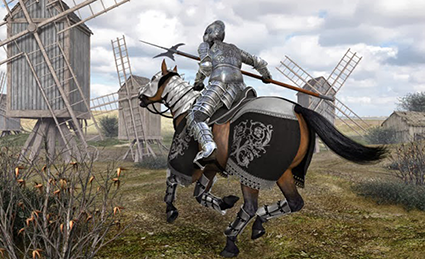
One Last Tilt at the Windmill

By Bob Barnes
Pastor, Glen Burnie UMC
As we know, our culture and our church family are at odds over the issue of homosexuality. One of the most aggravating things about our growing schism is that people on both sides of the debate are not that different. United Methodist "liberals" are not proponents of hedonism and/or perversion, and our "conservatives" are not scientifically illiterate bigots.
Why then can't we work together to find common ground on this issue?
Part of the problem is that there truly are some ideological differences that need to be examined with great care and charity. That said, there is another part of our challenge which is more emotive and visceral.
Many times our position in a debate is not determined by "what we think" so much as it is determined by "how we feel about what we think." What’s more, what we "feel" about an issue is often determined by what is being argued at the time when we become aware of and join in on a debate.
Thus it is possible for reasonable people with the same values to look at the same question but end up on different sides based on what they consider to be the real story or "narrative" of what the conflict is about. (This is part of the thought behind the concept of "Narrative Theory" which is a tool for understanding conflict.)
If you can follow what I am suggesting, I would like to describe three different "narratives" through which we view homosexuality. Acknowledging these narratives will not make all of our differences go away; but doing so will permit us to respect one another more and raise the level of our discussions.
The first narrative is the story of people like my father. My father grew up from 1950-1970, during an era when heterosexual marriage was the norm and homosexuality was scarcely spoken of. For many people of his day, homosexuality was a perversion or disorder, but homosexual persons were a misunderstood minority who needed greater understanding. When we discuss homosexuality, my father's outlook is always "pastoral" and could be summed up with the words: "We need to understand that they are people too."
The second narrative belongs to many people who grew up in my generation and became aware of the world from roughly 1970-1990. Even though I am my father's son and internalized everything he taught me, for myself (and many others) the narrative of homosexuality that we learned was very different.
I grew up and became a Christian after the sexual revolution in a world where my father's values were being overthrown. During this time, homosexual activists began to ask for and demand their rights and their message was a mixed one.
For instance, the Homosexual Agenda of 1972 (which was drafted in a United Methodist Church) sought many basic civil rights that almost all United Methodists would find reasonable. It also called for the legalization of prostitution, the abolition of the minimum age of consent (which would enable pedophiles) and the recognition of relationships involving more than two people.
My father and I both remember the days when pro-pedophilia spokespersons were regularly seen on talk TV. What is notable is that, although we both strongly disagreed with the ideas being presented, my father was less bothered by these speakers than I was. I think this was because the world in which my father had grown up would never accept what these groups were promoting, but I had no such confidence. Thus, for me and many of my generation, our narrative led us to a place where we had no difficulty in accepting homosexual persons but we believed there was a homosexual agenda that had to be resisted and a foundational morality that needed to be "conserved."
Finally, a very different narrative image has shaped the thinking of many who formed their opinions about homosexuality from 1990 to the present. Much of this change can be explained by a controversial book.
In 1990, psychologist Marshall Kirk and ad-man Hunter Madsen joined their talents together to write "After the Ball: How America Will Conquer Its Fear and Hatred of Gays in the 90's.” This book is a political blueprint that challenged the homosexual community to win the hearts of Americans by changing their public image. Soon, homosexuality began to be presented as a condition of birth and not a choice. The stated goal was not to live differently from everyone else but to fit in. Thus the image of the parading drag queen was replaced by the boy who wanted to join the boy scouts, the gay man who wanted to serve his country and the lesbian couple that wanted to get married. To those who have accepted this narrative, anyone who can't is deemed “hateful.”
So which narrative is the "true one?” I would argue that none of them are entirely true or entirely false. There is wisdom and folly blended into all three. Reality and humanity are more complex than simple generalizations.
So what’s the point?
This essay is not really about homosexuality or gay marriage. It is about this question: Can we as United Methodists stay married to one another in Christ?
I still hold out a fool's hope for us, but for anything to ever really change, all of us will need to drop our little narratives that define our moral passions and seek out the Greater Narrative together.

Login/Register to leave comment